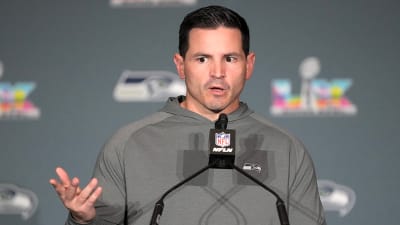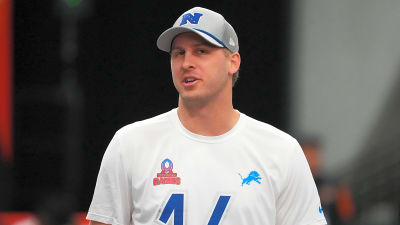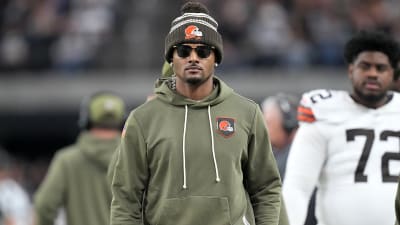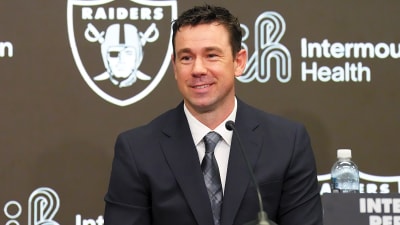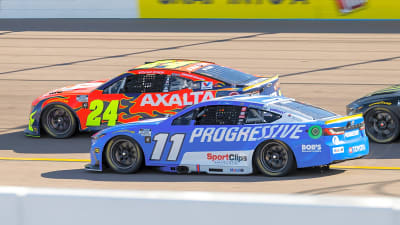- Home
- Quizzes
- My Quiz Activity
- Newsletters
- MY FAVORITES
- Add Sports/Teams
- SPORTS
-
NFL
- NFL Home
- Arizona Cardinals
- Atlanta Falcons
- Baltimore Ravens
- Buffalo Bills
- Carolina Panthers
- Chicago Bears
- Cincinnati Bengals
- Cleveland Browns
- Dallas Cowboys
- Denver Broncos
- Detroit Lions
- Green Bay Packers
- Houston Texans
- Indianapolis Colts
- Jacksonville Jaguars
- Kansas City Chiefs
- Las Vegas Raiders
- Los Angeles Chargers
- Los Angeles Rams
- Miami Dolphins
- Minnesota Vikings
- New England Patriots
- New Orleans Saints
- New York Jets
- New York Giants
- Philadelphia Eagles
- Pittsburgh Steelers
- San Francisco 49ers
- Seattle Seahawks
- Tampa Bay Buccaneers
- Tennessee Titans
- Washington Commanders
-
MLB
- MLB Home
- Athletics
- Arizona Diamondbacks
- Atlanta Braves
- Baltimore Orioles
- Boston Red Sox
- Chicago White Sox
- Chicago Cubs
- Cincinnati Reds
- Cleveland Guardians
- Colorado Rockies
- Detroit Tigers
- Houston Astros
- Kansas City Royals
- Los Angeles Angels
- Los Angeles Dodgers
- Miami Marlins
- Milwaukee Brewers
- Minnesota Twins
- New York Yankees
- New York Mets
- Philadelphia Phillies
- Pittsburgh Pirates
- San Diego Padres
- San Francisco Giants
- Seattle Mariners
- St. Louis Cardinals
- Tampa Bay Rays
- Texas Rangers
- Toronto Blue Jays
- Washington Nationals
-
NBA
- NBA Home
- Atlanta Hawks
- Boston Celtics
- Brooklyn Nets
- Charlotte Hornets
- Chicago Bulls
- Cleveland Cavaliers
- Dallas Mavericks
- Denver Nuggets
- Detroit Pistons
- Golden State Warriors
- Houston Rockets
- Indiana Pacers
- Los Angeles Clippers
- Los Angeles Lakers
- Memphis Grizzlies
- Miami Heat
- Milwaukee Bucks
- Minnesota Timberwolves
- New Orleans Pelicans
- New York Knicks
- Oklahoma City Thunder
- Orlando Magic
- Philadelphia 76ers
- Phoenix Suns
- Portland Trail Blazers
- Sacramento Kings
- San Antonio Spurs
- Toronto Raptors
- Utah Jazz
- Washington Wizards
-
NHL
- NHL Home
- Anaheim Ducks
- Boston Bruins
- Buffalo Sabres
- Calgary Flames
- Carolina Hurricanes
- Chicago Blackhawks
- Colorado Avalanche
- Columbus Blue Jackets
- Dallas Stars
- Detroit Red Wings
- Edmonton Oilers
- Florida Panthers
- Los Angeles Kings
- Minnesota Wild
- Montreal Canadiens
- Nashville Predators
- New Jersey Devils
- New York Islanders
- New York Rangers
- Ottawa Senators
- Philadelphia Flyers
- Pittsburgh Penguins
- San Jose Sharks
- Seattle Kraken
- St. Louis Blues
- Tampa Bay Lightning
- Toronto Maple Leafs
- Utah Mammoth
- Vancouver Canucks
- Vegas Golden Knights
- Washington Capitals
- Winnipeg Jets
- NCAAF
- NCAAM
- Olympics
- Boxing
- Entertainment
- Lifestyle
- Golf
- MMA
- Soccer
- Tennis
- Wrestling
- Sports Betting
- More Sports
- RESOURCES
- My Account
- YB on Facebook
- YB on Twitter
- YB on Flipboard
- Contact Us
- Privacy Policy
- Terms of Service
Looking back at Super Bowls 1-50
A look back at the NFL's biggest game throughout the years
Super Bowl I - Green Bay Packers d. Kansas City Chiefs, 35–10
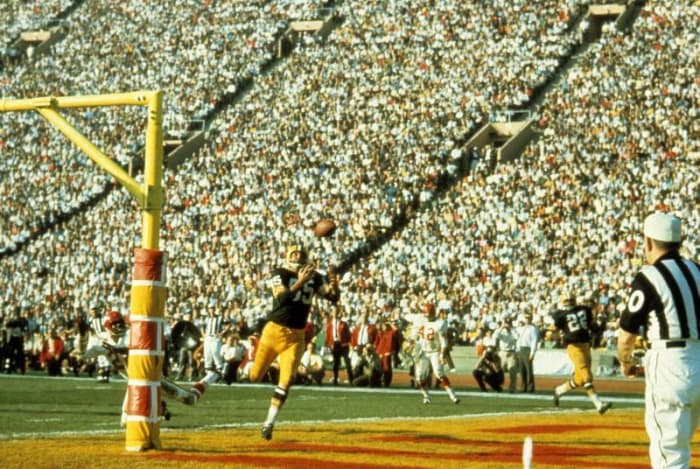
The inaugural AFL-NFL World Championship Game (later to be retroactively named Super Bowl I) saw a competitive first-half contest turn into an utter rout of the Chiefs by the Packers. After being outgained in total yards in the first half (though up 14–10 at halftime), Packers safety Willie Wood returned the first-ever pick-six in a Super Bowl 50 yards for a touchdown, and the Pack never looked back, scoring 21 unanswered second-half points and crushing the Chiefs 35–10.
Super Bowl II - Green Bay Packers d. Oakland Raiders, 33–14
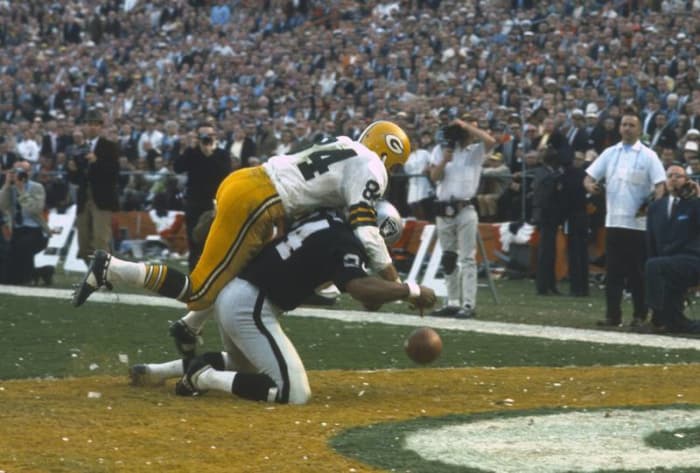
Again heavily favored to beat their AFL opposition, the Packers put on a defensive showcase against the Raiders, holding them to only two touchdowns, one each in the second and fourth quarters. The Packers ripped off 13 straight points through the first half, though Raiders quarterback Daryle Lamonica made it a 13–7 game by the half. Green Bay added another 13 points to start the second half, and defensive back Herb Adderley grabbed a backbreaking pick-six off Lamonica early in the fourth quarter to put the game away for good.
Super Bowl III - New York Jets d. Baltimore Colts, 16–7

The first championship contest to officially bear the name "Super Bowl" will live on in NFL lore thanks to Joe Namath's brash guarantee of victory over the heavily favored Baltimore Colts. The Jets delivered on Namath's promise, controlling much of the game through possession and building a 16–0 lead heading into the fourth quarter. The Colts replaced ineffective starting quarterback Earl Morrall with Johnny Unitas, who managed to set up the team's only score with 3:19 left in regulation, but the Jets put the game away. Namath earned MVP honors despite not throwing a touchdown in the game, nor even a single pass in the fourth quarter.
Super Bowl IV - Kansas City Chiefs d. Minnesota Vikings, 23–7

The final championship showdown between AFL and NFL teams before the merger saw quarterback Len Dawson lead the Chiefs to a Super Bowl victory after their loss to the Packers in Super Bowl I. The Vikings, widely expected to dominate the game, had no answer for the Kansas City defense, which limited Minnesota to only 67 rushing yards and forced five turnovers. The Chiefs held the Vikings scoreless until the third quarter; up 16–7 after a Vikings touchdown, Len Dawson hit Otis Taylor for a short pass that turned into a long touchdown, and the Chiefs effectively sealed the game.
Super Bowl V - Baltimore Colts d. Dallas Cowboys, 16–13

The first post-merger Super Bowl was characterized by sloppy play, botched officiating, and a number of penalties and turnovers, earning it the moniker "Blunder Bowl." Both teams combined for a record 11 turnovers, with the Colts' seven turnovers setting a record for most by a winning team. Baltimore quarterback Johnny Unitas was knocked out of the game in the second quarter, resulting in the much-maligned Earl Morrall taking his place. Morrall was still widely blamed for the Colts' Super Bowl III loss but did enough to keep the Colts alive for Jim O'Brien to kick the game-winning field goal as time ran out.
Super Bowl VI - Dallas Cowboys d. Miami Dolphins, 24–3
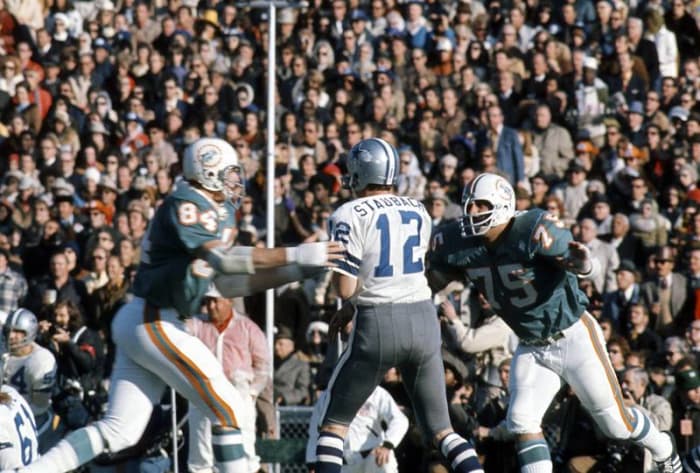
The Cowboys shook off a reputation for not being able to win big games by winning the biggest game in dominant fashion. Roger Staubach earned MVP honors for his mistake-free passing day, but the Dallas defense's contribution should not be overlooked. Known as the "Doomsday Defense," the Cowboys' D harassed Dolphins quarterback Bob Griese all day, eventually holding him to only 123 yards and barely allowing him to complete half his passes. Even more impressive, the Dallas defense remains the only to not allow the opponent to score a touchdown.
Super Bowl VII - Miami Dolphins d. Washington Redskins, 14–7

The 1972 Miami Dolphins live on as the only team to go undefeated in both the regular season and playoffs, bouncing back after the previous year's Super Bowl loss to the Cowboys. Despite only scoring two touchdowns in the first half, that was enough to keep the Redskins at bay, and the Miami defense shut Washington out until 2:07 remained in regulation. Kicker Garo Yepremian infamously kicked too low, resulting in a block and an eventual Washington recovery for a touchdown for the game's only real drama. Dolphins safety Jake Scott earned MVP honors for his two interceptions.
Super Bowl VIII - Miami Dolphins d. Minnesota Vikings, 24–7

Miami's second consecutive Super Bowl win came in similar fashion to the previous year's contest against Washington: a dominant defensive performance but with more offense. Fullback Larry Csonka ran roughshod over the Vikings, gaining 145 yards on 33 carries and a touchdown as the Dolphins scored 24 unanswered points, only allowing the Vikings their first score in the fourth quarter with the game well out of hand. Csonka's efforts were rewarded as he became the first running back to earn Super Bowl MVP honors.
Super Bowl IX - Pittsburgh Steelers d. Minnesota Vikings, 16–6

Two legendary defenses collided in Super Bowl IX, with Pittsburgh's Steel Curtain meeting the Vikings' Purple People Eaters in a game that saw both teams' future Hall of Fame quarterbacks struggle to break out. The first half saw the only score go to the first-ever safety in the Super Bowl, when the Vikings' Fran Tarkenton was sacked in his own end zone. Steelers fullback Franco Harris ended up rushing for more yards (a Super Bowl record 158) than the Vikings earned in total (119), picking up a touchdown in the third quarter. A Terry Bradshaw touchdown pass in the fourth put the game away, with the Vikings only scoring on a blocked punt prior to the Bradshaw TD. Underscoring their futility, the Vikings missed the extra point attempt.
Super Bowl X - Pittsburgh Steelers d. Dallas Cowboys, 21–17
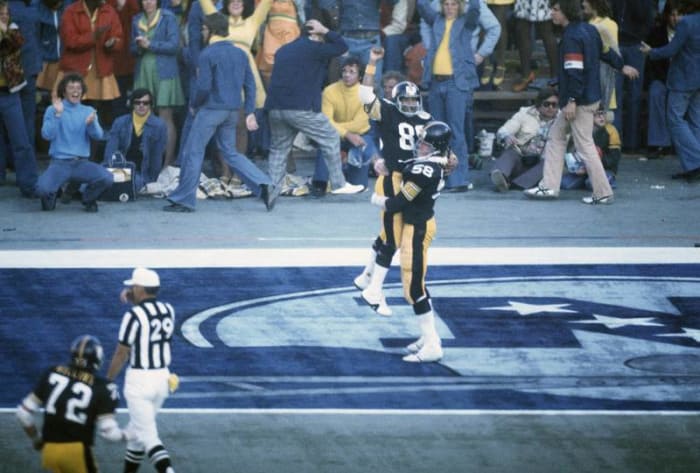
The Steelers' and Cowboys' contrasting styles, featuring suffocating defense vs. high-tech offense, respectively, collided to deliver a title game that went down to the wire. After keeping things close through the first three quarters, Pittsburgh came back from a 10–7 deficit to score 14 unanswered points in the fourth quarter, ending the run with a 64-yard touchdown pass from Terry Bradshaw to Lynn Swann. Though the Cowboys rallied under Roger Staubach to cut the lead to 21–17, a last-minute drive opportunity after a turnover on downs was unsuccessful, with Staubach's Hail Mary attempt getting tipped and picked off to seal the game for the Steelers.
Super Bowl XI - Oakland Raiders d. Minnesota Vikings, 32–14

The Vikings looked to grab their first Super Bowl win after three failed tries. Their fourth attempt fared no better, as the team's vaunted Purple People Eaters defense gave up a whopping 429 yards to the Oakland offense, along with four touchdowns and two field goals. The game saw Minnesota trail 16–0 in the first half and never got better, with the Raiders tacking on an additional 16 points in the second half via field goal, rushing TD and a pick-six, dropping the Vikings to a dismal 0–4 Super Bowl record and earning the Raiders their first title.
Super Bowl XII - Dallas Cowboys d. Denver Broncos, 27–10
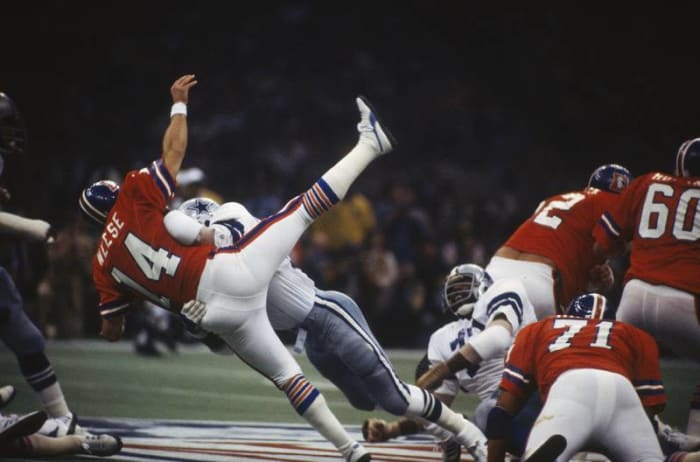
Craig Morton won the Cowboys' starting quarterback spot over Roger Staubach in the season leading up to the team's Super Bowl V loss to Baltimore. Staubach supplanted Morton the following year in Dallas and led the team to a title over Miami, so much of the story line leading up to SB XII revolved around the two former teammates squaring off against one another. The Broncos' famed Orange Crush defense and the Cowboys' Doomsday Defense were both highly regarded, though the Dallas defense proved the decisive factor. Randy White and Harvey Martin, the first and only co-Super Bowl MVPs, combined to force five turnovers by the Broncos, which led directly to 17 points by the Cowboys. Denver managed only 156 yards total offense, with the game well-decided by the third quarter.
Super Bowl XIII - Pittsburgh Steelers d. Dallas Cowboys, 35–31

The first Super Bowl to be a rematch of a previous one (Super Bowl X), the Steelers and Cowboys faced off in a showdown between a combined 16 future Hall of Famers. The talent level and star power were unmatched, with both teams looking to win a third title. After trailing 21–14 at the half, the Cowboys were able to cut the lead to four, only for the Steelers to come roaring back with two touchdowns to take a 35–14 lead. Despite a quick scoring drive and then a recovered onside kick to lead to another Staubach touchdown pass, the Cowboys were unable to recover a second onside kick attempt. Terry Bradshaw's phenomenal performance propelled the Steelers to victory, with the quarterback throwing for 318 yards and a Super Bowl-record four touchdowns.
Super Bowl XIV - Pittsburgh Steelers d. Los Angeles Rams, 31–19

The Rams went into their first Super Bowl appearance with a record of dominating the Steelers in the regular season. The heavily favored Steelers, winners of three titles in the 1970s, didn't take their opponents lightly, and the first half of their Super Bowl XIV matchup saw the lead change four times, with the Steelers down 13–10 to the Rams at the half. A Terry Bradshaw-Lynn Swann touchdown pass put the Steelers ahead early in the third quarter, but the Rams followed that up with a passing TD of their own. Bradshaw tossed a couple of third-quarter picks and kept the Steelers behind, but the Steel Curtain shut the Rams out in the fourth quarter, enabling the Pittsburgh offense to score 14 unanswered points to seal a fourth Super Bowl win in six years.
Super Bowl XV - Oakland Raiders d. Philadelphia Eagles, 27–10
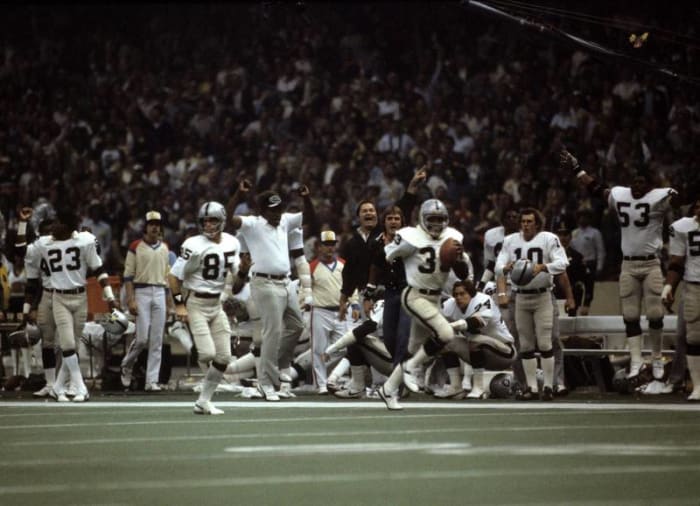
Jim Plunkett's chance at redeeming his NFL career came early in the 1980 season, when he took the starting job after Dan Pastorini went down with an injury. Plunkett led the Raiders to their third Super Bowl appearance to face the Eagles in that team's Super Bowl debut and promptly threw two touchdown passes in the first quarter to build what turned out to be an insurmountable lead. The Eagles were unable to sniff the lead, and Oakland won its second title handily.
Super Bowl XVI - San Francisco 49ers d. Cincinnati Bengals, 26–21
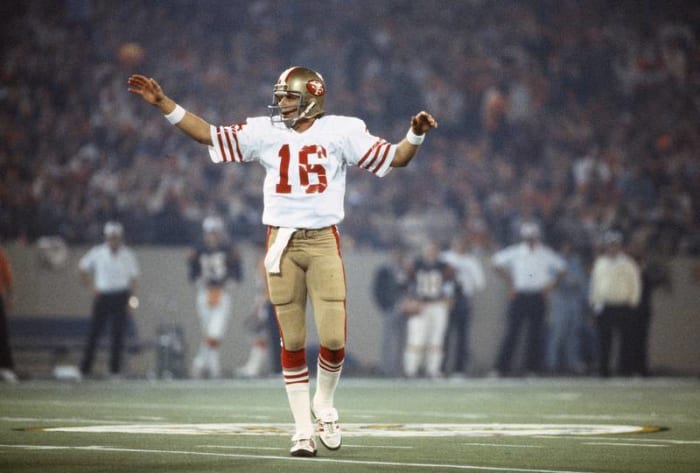
Super Bowl XVI saw some notable firsts: the first appearances of both the 49ers and Bengals, the first Super Bowl played in a cold-weather location (albeit within the confines of Detroit's Pontiac Silverdome), and the first time in Super Bowl history that the team with the most touchdowns and total yards lost. The Bengals outgained the 49ers in total yardage (356 to 275), but their three touchdowns weren't enough to overcome Joe Montana taking the Niners to a 20–0 first-half lead. A rally by Bengals quarterback Ken Anderson saw the Bengals come within six points early in the fourth quarter, though a goal line stand by the Niners defense and a couple of fields goals put the game out of reach, earning San Francisco its first Super Bowl win.
Super Bowl XVII - Washington Redskins d. Miami Dolphins, 27–17

After the strike-shortened 1982 season, the Redskins and Dolphins found themselves in a rematch of Super Bowl VII, where Miami finished off its perfect 17–0 season to beat Washington for its first Super Bowl win. This time around, however, the Dolphins were no match for the Redskins, particularly running back John Riggins, who set two Super Bowl records for most rushing yards in a game (166) as well as most carries (38). Riggins picked up an additional 15 yards on a reception, which put his total yards gained ahead of the entire Dolphins offense, as Washington overcame a 17–10 deficit in the first half to shut Miami out in the second and score 17 unanswered points.
Super Bowl XVIII - Los Angeles Raiders d. Washington Redskins, 38–9
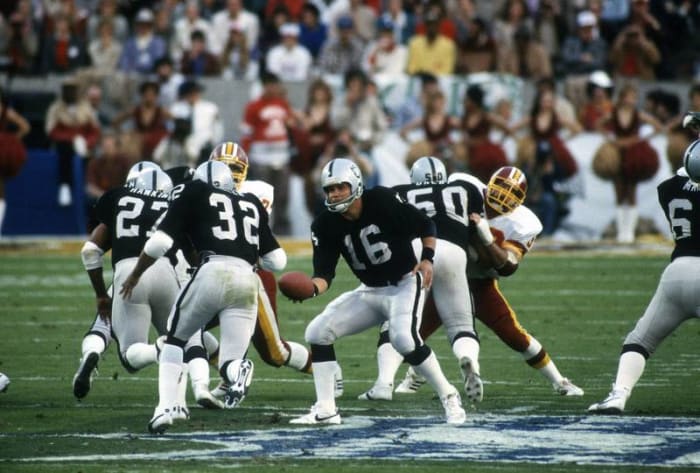
The Redskins returned to the Super Bowl as defending champs to take on a Raiders team that had moved to Los Angeles two years prior. Favored to win and repeat, the Redskins were instead completely trampled by the Raiders, who jumped out to a 21–3 lead by halftime and dominated Washington throughout. Raiders running back Marcus Allen was named MVP behind his Super Bowl-record 191 yards rushing and two touchdowns, one of which was a then-record 74-yard run.
Super Bowl XIX - San Francisco 49ers d. Miami Dolphins, 38–16

Super Bowl XIX was hyped as a clash of legendary quarterbacks: San Francisco's Joe Montana and Miami's Dan Marino. Both put up big passing days, marking the first time both quarterbacks passed for over 300 yards in a Super Bowl. The Niners trailed the Dolphins 10–7 in the first quarter but then scored a blistering three touchdowns in the second to Miami's two field goals, and then shut out the Dolphins in the second half entirely while adding another 10 points to put the game away.
Super Bowl XX - Chicago Bears d. New England Patriots, 46–10

The showdown between the Bears and Patriots in Super Bowl XX marked the most recent time two teams made their Super Bowl debuts. The Bears, renowned for their defensive prowess, led the league in several defensive statistical categories and recorded an impressive two postseason shutouts on their way the Super Bowl. The Patriots jumped out to the then-quickest lead in Super Bowl history after a Jim McMahon fumble on the second play of the game turned the ball over to the Pats, who kicked a field goal shortly after. That was about as good as got for New England, who went on to give up 44 unanswered points to Chicago, including a 1-yard rushing touchdown by lineman William "The Refrigerator" Perry.
Super Bowl XXI - New York Giants d. Denver Broncos, 39–20

John Elway's first Super Bowl appearance came against the Giants' Big Blue Wrecking Crew, who'd allowed only three points in their postseason run up to the Super Bowl. Elway was able to keep the Broncos ahead in the first half, though he would be sacked for a safety to cut the Denver lead to 10–9. From there, it just got worse for the Broncos, as the Giants would outscore the Broncos 30–10 in the second half behind quarterback Phil Simms and running Joe Morris, earning the G-Men their first Super Bowl win.
Super Bowl XXII - Washington Redskins d. Denver Broncos, 42–10

John Elway would get his second title shot after his heartbreaking loss to the Giants in Super Bowl XXI. After the Denver defense forced a three-and-out on the first series of the game, the Broncos scored on their first play from scrimmage on an Elway bomb for a 56-yard touchdown. The Broncos would score again on a field goal to take a 10–0 lead after the end of first quarter, but that proved the only bright spot in the game. The Redskins would bounce back to score a record five touchdowns in the second quarter, eventually shutting out the Broncos the rest of the way to a 42–10 rout.
Super Bowl XXIII - San Francisco 49ers d. Cincinnati Bengals, 20–16

The Bengals had a chance to avenge their Super Bowl XVI loss to the 49ers in 1989, though a superior regular season and MVP quarterback in Boomer Esiason weren't enough to put them as favorites over Joe Montana. Montana cemented his legendary status by engineering a fourth-quarter, game-winning drive with San Francisco down 16–13. With 3:20 left in regulation, Montana gathered his offense in the huddle and famously pointed into the crowd and asked, "Hey, isn't that John Candy?" before leading the Niners on an 11-play, 92-yard drive to take the lead for good.
Super Bowl XXIV - San Francisco 49ers d. Denver Broncos, 55–10

Joe Montana led the Niners to their third championship in dramatic fashion and gave them a chance for back-to-back Super Bowl wins the following year. John Elway, back for his third Super Bowl appearance with the Broncos, was hungry for his first win. This wouldn't be it, as the Niners set records for most points scored in a Super Bowl to go along with the largest margin of victory behind Montana's Super Bowl record five touchdown passes.
Super Bowl XXV - New York Giants d. Buffalo Bills, 20–19

The Buffalo Bills would start their incredible four consecutive Super Bowl appearances in a most inauspicious way. A close game against the Giants saw five lead changes, with three in the second half alone. After taking the lead on a Thurman Thomas rushing touchdown, a Giants field goal on the next possession put the Bills behind by a single point. Bills quarterback Jim Kelly led the team to the Giants 29-yard line with 0:08 remaining. Kicker Scott Norwood took the 47-yard field goal attempt, which infamously went wide right and cost the Bills their first attempt. To date, this marked the only time a potential Super Bowl-winning field goal would cost the kicking team the game if the kick were missed.
Super Bowl XXVI - Washington Redskins d. Buffalo Bills, 37–24

The Bills returned to the Super Bowl after the heartbreak of Wide Right to face a Washington Redskins team that had the league's best regular-season record and highest-scoring offense. The Bills, whose defense ranked second to last in total yards allowed, had no answer for the Washington attack, and the Redskins jumped to an early 24–0 lead that proved insurmountable for the Bills. A quick 10-point run in the third quarter was stifled by a Washington drive that took the lead to 31–10, and the Bills found themselves joining the Vikings and Broncos as the third team to lose back-to-back Super Bowls.
Super Bowl XXVII - Dallas Cowboys d. Buffalo Bills, 52–17

The Bills became just the second team to play in three straight Super Bowls (Miami being the first) and, at the hands of the emergent Dallas Cowboys, became the first to lose three consecutive Super Bowls. The Cowboys defense would force a record nine turnovers by the Bills, and though Buffalo would get the game to within two touchdowns, the Cowboys would score 21 fourth-quarter points to seal the win.
Super Bowl XXVIII - Dallas Cowboys d. Buffalo Bills, 30–13

The Bills would make their fourth consecutive Super Bowl appearance to square off against the Cowboys, marking the first time the same two teams went head-to-head in back-to-back Super Bowls. Buffalo fared slightly better, leading the Cowboys 13–6 in the first half. However, they were completely shut out in the second, ceding 24 unanswered points to Dallas and heading home empty-handed with an unfortunate air of futility about them.
Super Bowl XXIX - San Francisco 49ers d. San Diego Chargers, 49–26

Steve Young had stepped out of Joe Montana's shadow in a big way after the latter was traded in 1993 to the Chiefs. Young led the league in passing through the 1994 season, earning an MVP award and a postseason trip, where the 49ers would go on to face the San Diego Chargers, marking the first time two California teams would face off against one another in the Super Bowl. Young shone on football's biggest stage much like he had during the regular season, throwing a Super Bowl record six touchdowns as the 49ers dominated the Chargers for their fifth Super Bowl win.
Super Bowl XXX - Dallas Cowboys d. Pittsburgh Steelers, 35–21

Longtime rivals Dallas and Pittsburgh squared off for the fifth time, with Pittsburgh having won one the previous four meetings. This time, however, the Steelers had no answer for the Cowboys, winners of two of the previous three Super Bowls. An early Dallas lead was bolstered by Dallas cornerback Larry Brown's two second-half interceptions, both of which set up touchdowns for the Cowboys to put the game out of reach. Pittsburgh was dealt its first Super Bowl loss, and the Cowboys firmly established themselves as the team of the 1990s.
Super Bowl XXXI - Green Bay Packers d. New England Patriots, 35–21

Both the Packers and Patriots spent much of the 1990s as losing teams, but the leadership of quarterbacks Brett Favre and Drew Bledsoe, respectively, propelled both to the Super Bowl after prolong absences. After taking a 14–10 lead in the first quarter, Brett Favre threw for a touchdown and ran for another in the second quarter as part of a 17–0 run. After a 99-yard kickoff return TD from Desmond Howard in the third quarter, the Patriots never recovered, and Green Bay earned its first championship since the days of Bart Starr and Vince Lombardi.
Super Bowl XXXII - Denver Broncos d. Green Bay Packers, 31–24

While the Packers earned a back-to-back trips to defend their title, the Broncos and John Elway were looking to claim their first Super Bowl after four previous appearances (three with Elway). Denver finally earned its first Lombardi Trophy, keeping the lead for much of the game before Brett Favre and Antonio Freeman managed to tie it in the fourth quarter. But running back Terrell Davis scoring the go-ahead touchdown with less than two minutes left on the clock.
Super Bowl XXXIII - Denver Broncos d. Atlanta Falcons, 34–19

Few athletes have exited their careers on as a high a note as John Elway. After exorcising his Super Bowl demons the previous year against Green Bay, Elway took full command of Denver's second consecutive trip with his Super Bowl XXXIII performance, building a strong lead against the Falcons and never letting up. Named Super Bowl MVP, Elway would retire in the offseason at age 38.
Super Bowl XXXIV - St. Louis Rams d. Tennessee Titans, 23–16

The showdown between the Rams and Titans will forever go down as one of the most dramatic finishes in Super Bowl history. After the defensive battle of the first half, St. Louis led 9–0 at the half, only to add to their lead with a touchdown midway through the third quarter to go up 16–0. The Titans would answer by scoring 16 unanswered points of their own, the largest deficit to be erased in a Super Bowl, to tie the game with just 2:12 to play. The Rams responded with a Kurt Warner-Isaac Bruce 73-yard touchdown on the very first play of the ensuing drive, taking the lead once again and giving the Titans the opportunity to tie with the final drive. Steve McNair managed to bring the Titans to the Rams' 10-yard line and used their final timeout with 0:06 left. On the famous final play, McNair hit receiver Kevin Dyson five yards out, but Rams linebacker Mike Jones switched off his man and wrapped up Dyson's legs. Both men rolled, with Dyson stretching the ball out to within inches of the goal line, but was ruled down to give the Rams their first Super Bowl championship.
Super Bowl XXXV - Baltimore Ravens d. New York Giants, 34–7

Baltimore's first Super Bowl trip since the Colts' Super Bowl V victory was a defensive showcase, with the Ravens' No. 2-ranked defense keeping a lid on the Giants offense throughout. By the game's end, the Giants were held to only 152 yards total offense, with Baltimore taking advantage of five New York turnovers to effectively put the game out of reach early.
Super Bowl XXXVI - New England Patriots d. St. Louis Rams, 20–17
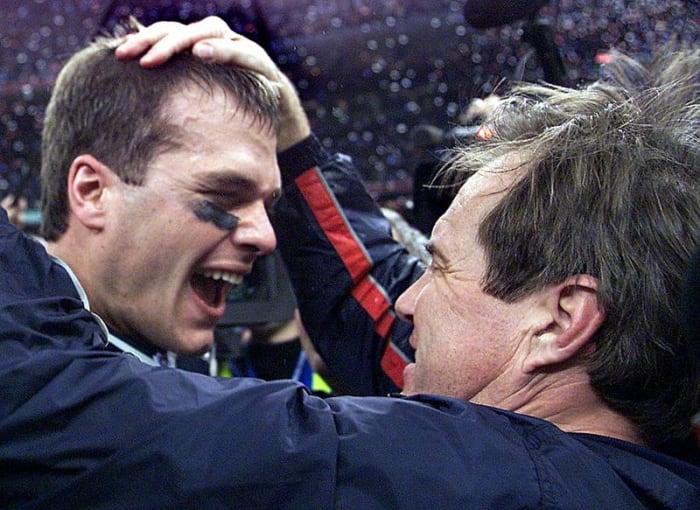
The Brady-Belichick era kicked off after Brady took over for an injured Drew Bledsoe, leading New England to an 11–5 record and forever earning the enmity of Raiders fans after the "Tuck Rule" game in the AFC Divisional Playoffs. The regular-season best Rams entered as the heavy favorite, but the Pats were able to jump to a 17–3 lead through the first three quarters. Warner brought the Rams back to tie it in the fourth quarter, running for a TD and throwing another, but Brady drove the Pats 53 yards to set up Adam Vinatieri's game-winning field goal as time expired.
Super Bowl XXXVII - Tampa Bay Buccaneers d. Oakland Raiders, 48–21
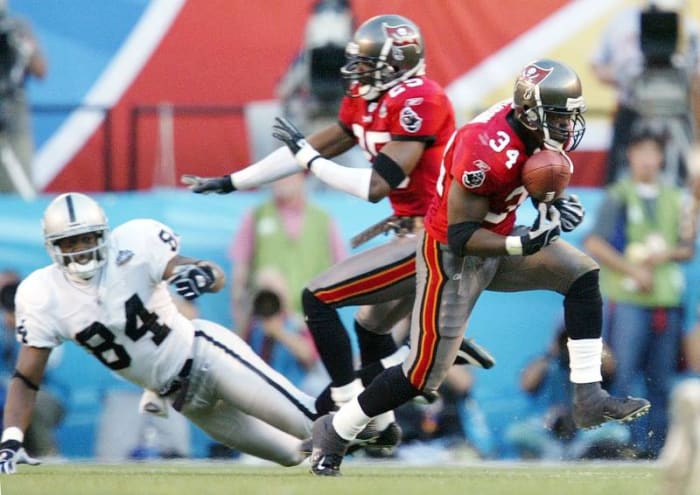
Jon Gruden was infamously traded to the Buccaneers for four draft picks due to Raiders owner Al Davis' notorious miserly attitude toward paying his head coaches. Davis would come to regret this this decision quickly, as his Raiders would meet Gruden's Bucs following the 2002 season. Armed with prior knowledge of his old team, Gruden guided his No. 1-ranked defense to neutralize the Raiders' No. 1-ranked offense. Raiders quarterback Rich Gannon threw a Super Bowl record five interceptions, the Bucs scored 34 unanswered points heading into the end of the third quarter and the game was never once in doubt for the Buccaneers.
Super Bowl XXXVIII - New England Patriots d. Carolina Panthers, 32–29

Lost amid the hoopla surrounding Janet Jackson's halftime "wardrobe malfunction" was one of the most entertaining Super Bowls of all time. The Patriots and Panthers combined for over 800 yards total offense, featuring a Panthers fourth-quarter comeback that saw them take a small lead, give another touchdown to the Patriots, and then tie it once again thanks to Jake Delhomme and Ricky Proehl. A botched kickoff after that game-tying score went out of bounds and gave Tom Brady a short field, and he took full advantage to drive and set Adam Vinatieri up for another game-winning field goal as time expired.
Super Bowl XXXIX - New England Patriots d. Philadelphia Eagles, 24–21
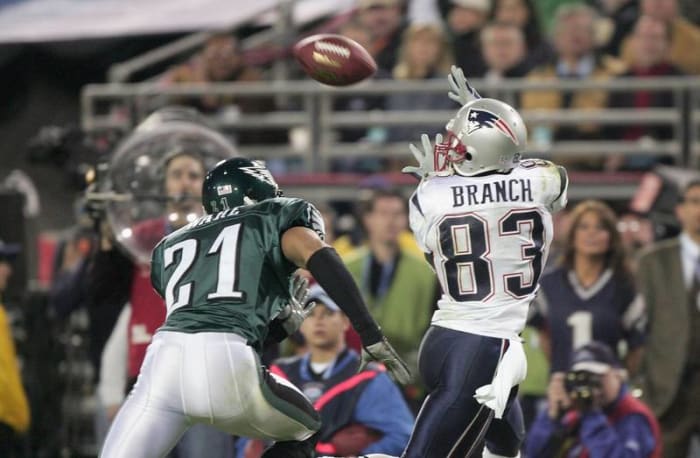
The Patriots cemented their legacy as the team of the 2000s by winning their third Super Bowl in four years. Their matchup with the Eagles saw a close game through three quarters, with the teams tied at 14. But the Pats would come back in the fourth and rip off 10 points to take the lead for good, and a late Donovan McNabb touchdown pass would prove too little, too late.
Super Bowl XL - Pittsburgh Steelers d. Seattle Seahawks, 21–10

The Steelers' first Super Bowl win since the Chuck Noll-Terry Bradshaw era came through a combination of a monster run game and a stifling defense. Pittsburgh's Willie Parker set a Super Bowl record for longest rushing touchdown, taking it 75 yards to the house and, after giving up a touchdown to the Seahawks in the third quarter, sealed the game with a fourth-quarter 43-yard touchdown pass from receiver Antwaan Randle El to fellow receiver Hines Ward.
Super Bowl XLI - Indianapolis Colts d. Chicago Bears, 29–17
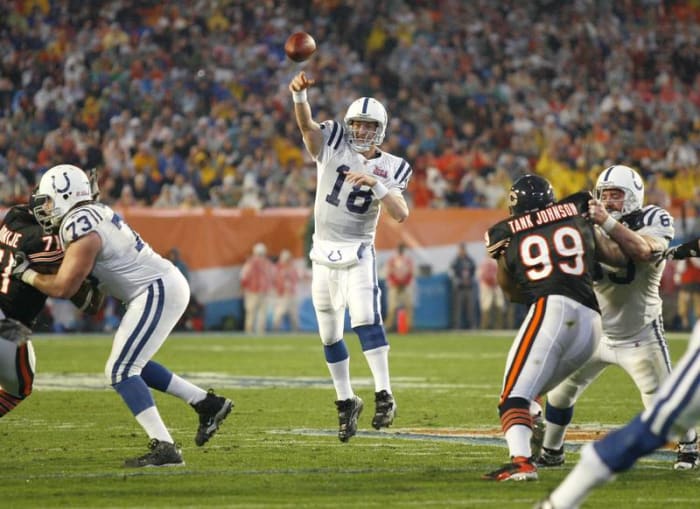
Peyton Manning led the Colts to their first Super Bowl since the team's Super Bowl V victory, taking on a Chicago Bears team making its first appearance since Chicago's Super Bowl XX win. After giving up a 14–6 lead in the first quarter, Manning led the team back, helping to put up 23 points in the remaining three quarters while the Colts defense only gave up three.
Super Bowl XLII - New York Giants d. New England Patriots, 17–14
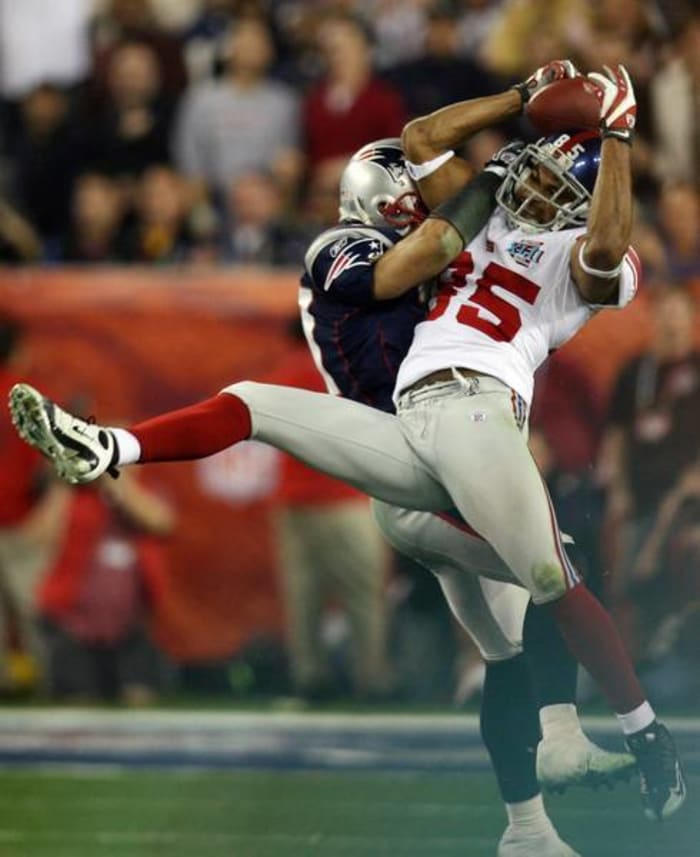
Super Bowl XLII will forever be immortalized by David Tyree's "Helmet Catch" off an Eli Manning pass made after the quarterback scrambled to avoid several Patriots defenders. The underdog Giants trailed throughout the game until the fourth quarter, when they took a lead briefly before Tom Brady connected with Randy Moss on a touchdown pass to give Manning just under three minutes to come back for the win. Of course, he did, and an all-time great Super Bowl moment was born.
Super Bowl XLIII - Pittsburgh Steelers d. Arizona Cardinals, 27–23
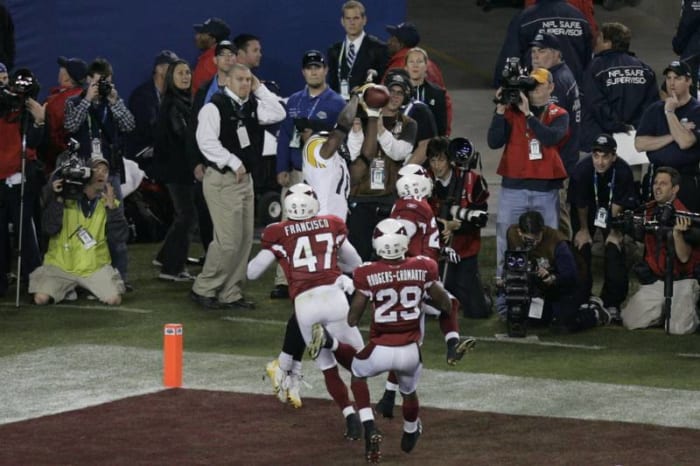
If you're a fan of big, last-minute, dramatic catches, Super Bowls XLII and XLIII offered great, back-to-back drama. The Steelers led the Cardinals 20–7 heading into the fourth quarter, only to cough up 16 straight points and the lead. With two and a half minutes left in regulation, Ben Roethlisberger led the Steelers 78 yards up the field, capping off the drive with a perfectly thrown ball into the end zone corner, where Santonio Holmes extended to make the grab and miraculously keep both feet inbounds for the win.
Super Bowl XLIV - New Orleans Saints d. Indianapolis Colts, 31–17

The Colts had a healthy 10–6 lead heading into halftime of Super Bowl XLIV, but a surprise onside kick to start the second half helped spark the Saints to their first Super Bowl win. After cutting the Colts' lead to one point, New Orleans scored 15 unanswered points in the fourth quarter, including Tracy Porter's backbreaking pick-six of Peyton Manning, to put the game away for good.
Super Bowl XLV - Green Bay Packers d. Pittsburgh Steelers, 31–25
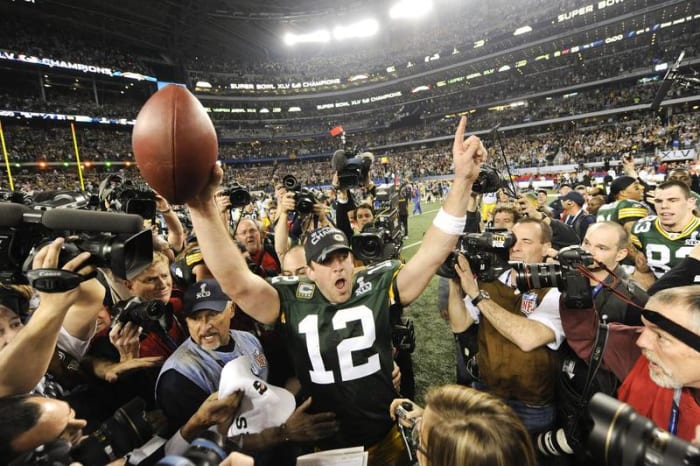
Aaron Rodgers stepped out from behind Brett Favre's shadow, putting up a terrific 304-yard, three-touchdown performance against the Steelers. After building a 21–10 first-half lead, the Packers weathered a couple of second-half touchdowns that put the Steelers in range and never let up. Ben Roethlisberger threw a touchdown midway through the fourth quarter to bring it within three points, but the Packers set up a Mason Crosby field goal with just over two minutes to play. The defense held, and the Packers won their fourth championship of the Super Bowl era.
Super Bowl XLVI - New York Giants d. New England Patriots, 21–17

Eli Manning sealed his reputation as a clutch performer, bringing the Giants back against a Patriots team aching for a chance to avenge their Super Bowl XLII loss. The Patriots charged back from a 9–0 deficit to take a 17–9 lead in the third quarter. A pair of New York field goals cut the lead to two going into the fourth quarter, and neither team was able to score through much of the period. On the Giants' final drive, Eli Manning tossed a 38-yard pass to the left sideline, with receiver Mario Manningham making the crucial grab. The play set up a Giants touchdown, and less than a minute left to play, the Patriots were unable to score, giving the Giants their second Super Bowl victory over Brady and Belichick.
Super Bowl XLVII - Baltimore Ravens d. San Francisco 49ers, 34–31

Super Bowl XLVII saw head coaching brothers John and Jim Harbaugh go head to head, which propelled much of the story line leading up to the game. John's Ravens got off to a big 28–6 lead by early in the third quarter before a power outage at the Superdome stopped play for 34 minutes. Upon resuming play, the 49ers scored 17 unanswered points to bring the game within one score and continued to chip away at the lead. After a Ravens field goal brought the game to 31–23, the Niners scored on a Colin Kaepernick touchdown, only to fail on the two-point conversation attempt, and the Ravens were able to put the game away for good.
Super Bowl XLVIII - Seattle Seahawks d. Denver Broncos, 43–8

Hyped as a battle between the Broncos' unstoppable offense and the Seahawks' immovable defense (only the second time the No. 1-ranked offenses and defenses met in the Super Bowl, after Super Bowl XXXVII), the whole affair became the Seahawks' show. The opening Broncos play ended up a safety, giving Seattle a 2-0 lead, and the game never got better for Denver, who lost 43-8.
Super Bowl XLIX - New England Patriots d. Seattle Seahawks, 28-24
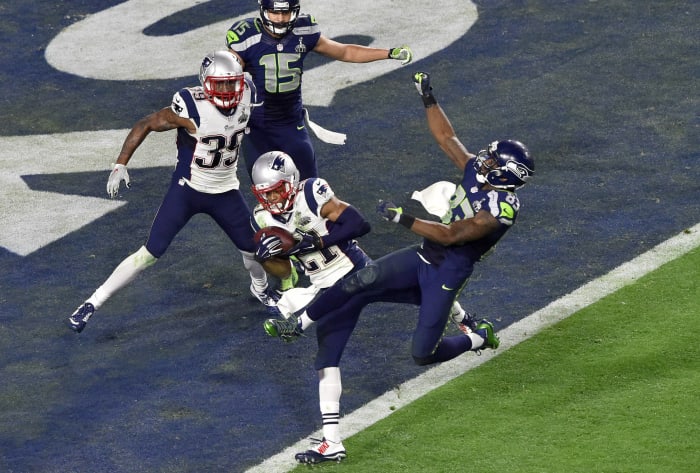
History was on the line, with Seattle having the chance to win back-to-back Super Bowls, while Tom Brady and Bill Belichick had the chance at a fourth Super Bowl title together. The game did not disappoint, with both teams putting up 14 points in the first half and the teams exchanging the lead throughout. However, it looked as though the Seahawks had taken command in the second half, scoring twice to take a 24-14 lead into the fourth quarter. That's when Brady worked his magic, tossing two unanswered touchdown passes to give the Pats a 28-24 lead. With history on the line, Russell Wilson hit Jermaine Kearse for 33 yards on a prayer. The crazy reception set the stage for one of the most dramatic endings in Super Bowl history. Facing a 2nd-and-1 at the goal line with 26 seconds left, everyone in the world expected bruising back Marshawn Lynch to get the ball. Instead, Seattle opted for a pass, Malcolm Butler of the Pats jumped the rout and picked off the pass, securing the fourth Super Bowl victory in Patriots history.
Super Bowl 50 - Denver Broncos d. Carolina Panthers, 24-10

The Panthers entered Super Bowl 50 red-hot, capping a 15-1 regular season by getting by the two-time defending NFC champion Seahawks and blowing out the Arizona Cardinals in the NFC Championship Game. Unfortunately for Newton and Co., they ran into one of the most dominant defenses in history, as the Denver Broncos completely stifled Carolina. With a 3-0 lead in the first quarter, Von Miller sacked Newton and caused a fumble, which was recovered and returned for a touchdown by Malik Jackson. While Denver didn't pull away, Broncos never relinquished the lead thanks to the defense, particularly Super Bowl MVP Miller, who added another sack and a half and forced fumble, sending Peyton Manning off into the sunset with his second Super Bowl victory of his career.
More must-reads:
- Super Bowl LX takeaways: Defense carries Seahawks to dominant win over Patriots
- New Dolphins regime has reportedly made huge Tua Tagovailoa decision
- The 'NFL active TD-pass leaders' quiz
Breaking News
Trending News
Customize Your Newsletter
 +
+
Get the latest news and rumors, customized to your favorite sports and teams. Emailed daily. Always free!
PRIVACY POLICY EDITORIAL POLICY CONTACT US
ABOUT YARDBARKER TERMS OF SERVICE
Use of this website (including any and all parts and
components) constitutes your acceptance of these
Terms of Service and Privacy Policy.
This site is for entertainment purposes only.
There is no gambling offered on this site.
Gambling Problem? Call 1-800-Gambler.


